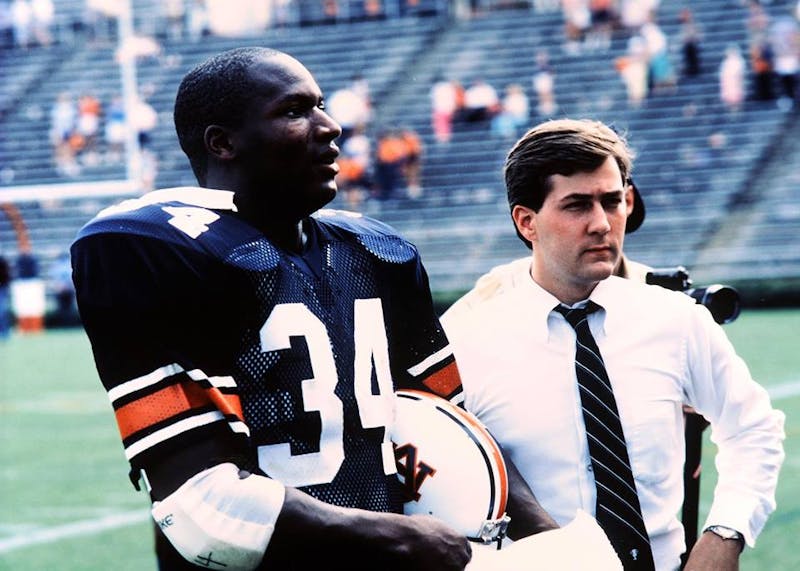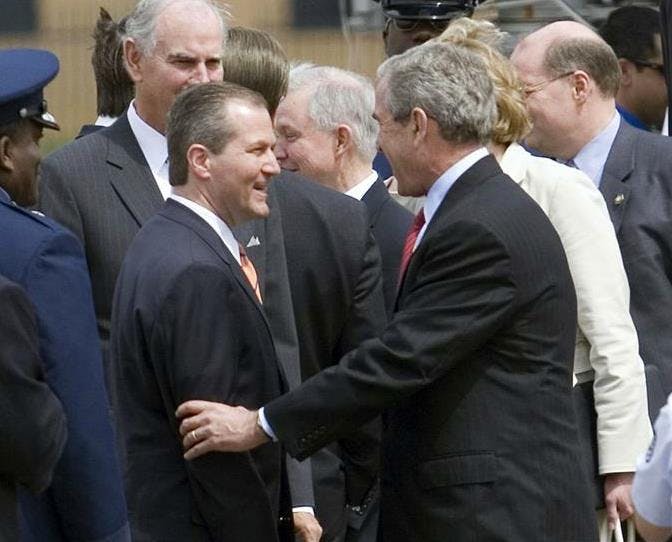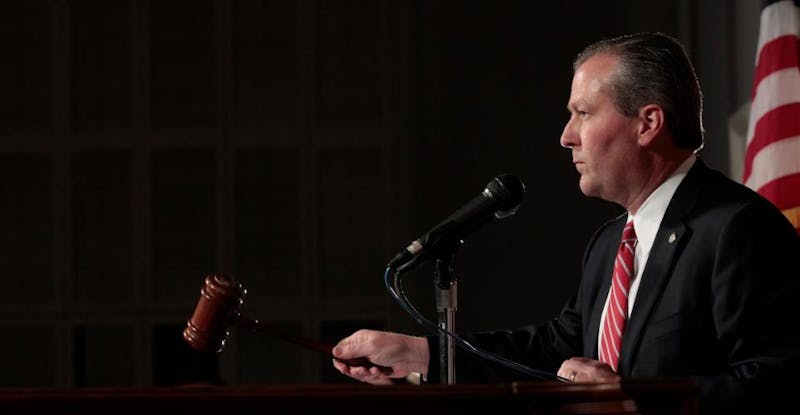This is the first in a series of articles on the trial of Mike Hubbard. Read the other installments here: part two; part three; part four; part five.
The story of Mike Hubbard sounds like an only-in-Alabama joke: A politician runs a statewide campaign against corruption, wins big, quickly passes some of the toughest ethics laws in the nation, then gets skewered by those very laws. But the case against Hubbard, the Speaker of the Alabama House, is no laughing matter. Even in a place where political corruption is as much a part of the landscape as kudzu, the extensiveness and brazenness of his alleged crimes have stunned even longtime followers of politics in the state.
“Mike Hubbard has been the overlord of an orgy of greed and corruption like we have never seen,” Bill Britt, host of Alabama’s weekly political talk show, The V, declared in a recent episode. “He is the Caligula of Alabama. Just a tyrant, and a mean and perverse guy.”
Hubbard wowed the national Republican Party in 2010 when he masterminded a GOP takeover of all branches of government in the Yellowhammer State. Before Hubbard came along, the legislature had been controlled by Democrats for 136 years, since Reconstruction. Two years later, a grand jury delivered 23 felony indictments against him. The trial, which begins its jury selection today, will offer a rare view into the greasy gears of Republican machine politics, showing in exquisite detail how the state of Alabama has been turned into a single-party vehicle for graft.
With his slick hair, pudgy belly, and car salesman’s smile, Hubbard looks every bit the Southern politician, a role for which he has been well-groomed. Born and raised in the Mayberry-esque town of Hartwell, Georgia, he was senior class president, the Georgia representative in a national high school civics competition in Washington D.C., and state champion of a “Voice of Democracy” speech contest (in which he beat future Christian Coalition leader Ralph Reed). But he cut his teeth as a campaigner in Southeastern Conference football, first as a journalism scholarship student at the University of Georgia, where he helped lead the public relations push for Hershel Walker’s 1982 Heisman Trophy. Then, as a flak for the Auburn University athletic department, he did the same for Bo Jackson in 1985.
He left the university to found his own media company, the Auburn Network, which won the broadcast rights for all Tiger sports and made him a millionaire. In 1996, Patrick Nix, quarterback for Auburn’s undefeated 1993 team, told him about a friend named Bob Riley who was running for Congress, and suggested that Hubbard’s experience might be of use to his campaign. Hubbard took an immediate liking to Riley. “It was the first time I had ever seen anyone wear cowboy boots with a suit and actually pull it off,” Hubbard wrote in his 2012 book, Storming the Statehouse: The Campaign that Liberated Alabama from 136 Years of Democrat Rule.

Hubbard joined the team and took to politics like a natural. “I found myself energized by the hand-to-hand combat style of the campaign and the excitement,” he wrote. They won, and Riley invited Hubbard to Washington for his swearing-in. There, a politician was born. “Watching my new friend taking his oath touched me deeply, and it unlocked a door in the back of my mind,” Hubbard wrote. “As I walked among the U.S. Capitol, the Supreme Court, the Library of Congress, and other symbols of our nation’s power … I began to ask myself if public service might be in my future.”
Two years later, with Riley’s help, he won a seat in the Alabama House, representing Auburn and much of Lee County. In 2002, Riley joined him in Montgomery after winning the governor’s office. Riley picked Hubbard to lead the state’s GOP, a position that gave him a seat on the Republican National Committee and earned him invitations to White House parties. He piled up scores of party contacts nationwide who helped him shape a strategy to flip Alabama to the red. But his biggest help came from the George W. Bush administration, whose prosecutors sent a long line of Democratic leaders to jail—the former Governor Don Siegelman, state representatives and senators, top party officials, and the mayor of Birmingham.
In the 2010 cycle, Hubbard recruited candidates in districts across the state, raised money, and provided staff support for them. Together they offered “A Republican Handshake with Alabama,” a platform full of right-wing red meat: a constitutional amendment declaring that life begins at conception; deep cuts to government spending; a tough anti-immigration policy that, once passed, would gain national attention for its harshness and get blocked by federal courts as unconstitutional; and, above all, strict new ethics laws.
All of Hubbard’s candidates won and, in the days following the election, several Democrats flipped, giving Republicans a super-majority in the statehouse, known to Alabamians as Goat Hill. Hubbard won the speakership and urged Governor Riley, then a lame duck, to call a rare special session in December to ram through a slate of tough ethics laws.
“This place used to be run by lobbyists,” Hubbard declared to the press after the session ended. “Now, it is run by lawmakers, and that’s how it ought to be.”
But from the beginning there were signs that Hubbard’s self-portrayal as a warrior for good government was an act. Hubbard’s hometown paper, Opelika-Auburn News, reported that he’d spent party money on services from one of his own businesses, Craftmaster Printers. Hubbard told the small-town reporter it was much ado about nothing. “Out of about 80 candidates, you have only two using Craftmaster,” he said. “Is this really a story?”
But his successor as chair of the state party had the accounts audited and found that Hubbard had bought more than $1 million worth of printing from Craftmaster with campaign funds that he controlled. Much of it came through a deal with Marketing Solutions of Florida, a political direct mail vendor that’s worked for Republican campaigns across the country, including Mitt Romney’s 2012 bid for president. The company is run by Brett Buerck, who fled Ohio in the early 2000s in the wake of a scandal that cost Larry Householder his position as Speaker of the House.

Then the Montgomery Advertiser reported that Hubbard had used the national Republican State Leadership Committee (RSLC) to launder gambling money from the Poarch Creek Indians to the state GOP. With three casinos in the state, the Poarch Creek had a monopoly, and Hubbard and his colleagues reached out to them to support their candidates, who opposed an expansion of gambling in the state that would create new competitors for the Poarch Creek. The money was funneled through the RSLC to hide donations that would be politically toxic to conservative values voters in the Alabama GOP’s base. (Politico later obtained an internal RSLC document that candidly confirmed that Hubbard and the committee had consciously broken the law.)
The party audit caught the attention of the state attorney general’s office, which had recently reopened a white collar crime division, headed by the newly hired Matt Hart, who as a prosecutor in the U.S. District Attorney’s Office had spearheaded the cases against Alabama’s Democrats, including Governor Siegelman and Birmingham Mayor Larry Langford. Hart did his job with such ruthlessness that Harper’s and the Huffington Post accused him of being a henchman in a Karl Rove-driven conspiracy to destroy the Democratic Party in Alabama, a notion that Hubbard lampooned throughout his memoir of the 2010 GOP takeover. But now it was Hubbard’s turn to cry foul.
“What happens when conservatives stand up to Barack Obama?” he asked. “They get attacked.”
The shenanigans involving Craftmaster and the RSLC were just the beginning. Despite passing a law that barred public officials from soliciting anything of value from a lobbyist or anyone who employs a lobbyist, Hubbard asked for work from his old pal Riley, who had registered as a lobbyist just months after stepping down as governor. Hubbard had been traveling the state, meeting with fellow legislators and constituents, all while complaining in emails that “unfortunately, none of it helps me make money!”
“I understand—believe me—I went 14 years on a Gov payroll and it was a Challenge,” the former governor replied.
“I need to be a salesman for BR&A,” Hubbard shot back, referring to Riley’s lobbying firm. “Except for those ethics laws. Who proposed those things?! What were we thinking?”
Riley didn’t hire him, but he did help him land a job as an “economic development consultant” with the Southeast Alabama Gas District (SEAGD) for $12,000 a month.
Elated, Hubbard emailed the ex-governor, “I am thankful for my Risen Lord.”
Before signing the contract, SEAGD asked for approval from the state’s notoriously lax ethics commission and got it, with the proviso that Hubbard not represent himself as the House Speaker in his consulting work. Then Hubbard proceeded to do precisely that, records show: In one of his monthly reports to SEAGD, he wrote of an exchange with an executive from South Korea-based Hankook Tire, which was looking to build a facility in the United States: “Mr. Kim believes that my role in government would mean a great deal and put Alabama at the top of the list if I were to visit.”
In the coming months and years, even as the grand jury investigation of Hubbard broadened and intensified, he snagged a $5,000-per-month gig with American Pharmacy Cooperative, Inc. (APCI), which employs lobbyists, and allegedly slipped into a Medicaid budget bill 23 words that gave his client a monopoly over the state’s multi-million-dollar prescription drug program, then voted for that bill twelve times. Edgenuity/E2020, another company that employs lobbyists in Montgomery, gave him a consulting contract for $7,500 a month. And a plastic cup manufacturer that also employs lobbyists started paying him $10,000 a month, even though he admitted to them in an email, “I know nothing about the plastic cup business.” He did, however, know how to lobby Governor Robert Bentley, which he allegedly did on the company’s behalf in its efforts to secure a contract at an employment training facility. All told, he was pulling in nearly $420,000 a year from these contracts.
Still, it wasn’t enough. Amid the flurry of checks coming in, Craftmaster defaulted on a loan for $600,000. He asked for help from Will Brooke, board member and former chairman of the Business Council of Alabama, which also employs lobbyists. “Failure is not an option as it means personal and political ruin,” Hubbard cried in an email. Brooke wrote up a business plan (itself a thing of value) calling for Hubbard to procure $150,000 from some of the wealthiest and most powerful businessmen in the state. Among the investors were four who employ lobbyists: Brooke himself; James Holbrook, president and CEO of investment firm Stern Agee; Rob Burton, the president of Hoar Construction; and Jimmy Rane, president of Great Southern Wood and the Auburn University Board of Trustees, who is perhaps better known as Yella Fella, the square-jawed cowboy hero of an online Western melodrama series. They each invested $150,000 in Craftmaster.
Starting
in 2012, the grand jury met for the better part of two years in the Lee County
seat of Opelika. Along the way, Hubbard’s fellow House member Greg Wren pleaded
guilty in exchange for testifying about helping Hubbard allegedly add the
language to the Medicaid bill that gave APCI a monopoly over the state’s
prescription drug program. Barry Moore, who Hubbard had recruited to run for a
House seat in 2010, was charged with perjury, though the jury acquitted him in
a decision that essentially said that he’d broken the law, but not so badly as
to merit punishment.

Two months before Election Day 2014, the grand jury came back with 23 indictments against Hubbard. Again Hubbard blamed Obama, calling the case against him a “political witch hunt.” The voters bought it: He crushed his poorly funded Democratic opponent and sailed back into the House, where he reclaimed the speakership on a 99-1 vote.
“He met with us and told us he was innocent,” explains Phil Williams, a Republican representing a district just outside of Huntsville. “He laid out a compelling case in front of us that the prosecutor was out of bounds, and we believed him.”
But the fact that Democrats also went along points to Hubbard’s unforgiving leadership style and the almost absolute power of the Alabama speakership.
“He had the votes among the Republicans, so he was going to be speaker no matter what,” says Beth Clayton, a Democrat political adviser from Auburn. “And he’s vindictive. So everyone voted for him. Otherwise, none of their bills would ever see the light of day.”
“Hubbard’s leadership style is completely top down,” says Britt, the host of The V and editor of the independent news site Alabama Political Reporter. “When he became speaker, he solidified power almost absolutely. If you disagreed with him, you were punished.”
In February, Hubbard removed several fellow Republicans from committees (including Williams)—some for taking the common GOP position of opposing tax increases, in this case on cigarettes, nursing home beds, and pharmacies, all of which passed in an earlier special session; one for proposing legislation to force lawmakers indicted for felonies, like Hubbard, to step down from leadership positions.
“Under Alabama’s Constitution, the speaker’s position is by far the most powerful in the state,” says Britt. “No legislation can move in the House without his approval.”
For more than a year now, Hubbard’s defense strategy has been to try everything to get the case thrown out, and, barring that, to delay. His lawyer, Bill Baxley, was the state’s attorney general in the 1970s and is best known for winning a conviction against the perpetrators of the 1963 bombing of a Birmingham Baptist church in which four girls were killed. In his role as a disheveled country lawyer, Baxley is deceptively sly, recently telling the judge in a pre-trial hearing that he not only wasn’t ready to go to trial, he hadn’t even prepared to argue the motions they were scheduled to address that day. Unmoved, the judge set a trial date for May 24 and pounded his gavel.
Meantime, it’s been business as usual on Goat Hill. In the session that recently ended, Hubbard and Governor Bentley pushed for an $800 million bond issue to build four new prisons at unnamed sites around the state, to be designed and built by an unnamed company with a no-bid contract. The move failed in the last hour of the session, in no small part because Bentley’s political capital has diminished in the wake of a sex scandal that broke open because of the Hubbard case.
As for what’s going to happen in the Lee County Courthouse in the coming weeks—which in turn will help determine whether Republicans continue to enjoy complete control in Alabama—it’s anybody’s guess.
“A lot of people in his district don’t believe he did it. They see his case as a persecution for his standing up to Obama,” says Clayton. “But the money might sway them. This is a county where the median income is $40,000.”
But one thing is guaranteed: The trial will offer Alabamians and the nation a clear picture of how power works in a state where one party and big money rule.
“Many of the power elites in the Republican establishment are on the witness stand,” says Britt. “And they will have to testify against him.”
